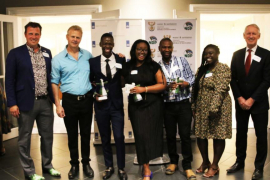
The Department of Water and Sanitation has called on young water professionals to come up with innovations that will help efforts to ensure water security.
The department’s Director-General (DG), Dr Sean Phillips, made the call at the Wetskills Water Challenge Award ceremony, held this week at the home of the Ambassador of the Kingdom of the Netherlands, Han Peters, in Pretoria.
During the ceremony, Phillips shared his passion for the sector with young professionals from different universities, including those already employed in the department.
The DG urged them to come up with realistic and practically implementable innovations.
“The sector is very technical and requires young, energetic and innovative minds. I am pleased that you are all here today and I see a clear and balanced representation of everyone. Young people are the future and if we cannot allow them to lead us, then we are shooting ourselves in the foot,” Phillips said.
The Wetskills Water Challenge is a two-week pressure-cooker programme for students and young professionals with a passion for water. The programme aims to find innovative and out-of-the-box solutions for water challenges in a changing world.
The challenge is hosted by the department, in conjunction with the Wetskills Foundation, the Embassy of the Netherlands, Dutch Water Authorities Africa and the Blue Deal programme.
The pressure cooker programme entails case studies formulated by case owners with a dedicated challenge in a local situation.
These cases are presented in an ice breaking and energizing session, where the cooperation between the Dutch water sector and the partner-country is showed and positioned, in this case being South Africa.
It provides a base to integrate different generations, water challenges, disciplines and cultures.
Winners of the sixth annual challenge focused on indigenous knowledge systems to respond to water vector diseases.
The case was led by the Water Research Commission (WRC) with team members coming from various institutions in the sector.
Use of indigenous plants for medicinal and other purposes
Pitching the case study to Dr Phillips and several other attendees at the awarding ceremony, 23-year-old Kagiso Mogajane highlighted the impact of climate change on the occurrence and distribution of water-vectored disease in South Africa.
“In as much as there is this occurrence across the globe, the situation is unique in our country. South Africa is a country rich in biodiversity and culture.
“We have indigenous knowledge systems surrounding our healthcare, including the use of indigenous plants for symptomatic treatment of infectious diseases,” Mogajane said.
Mogajane warned that harvesting of these indigenous plants in the wilderness places them at risk of extinction and threatens the countries’ precious biodiversity.
“It is for this reason that we aim to empower South African communities to use their indigenous knowledge through the implementation of community gardens. These gardens will cultivate indigenous plants that can serve not only sources of medicine but food and fuel,” said Mogajane.
WRC CEO, Dr Jennifer Molwantwa, has since committed that the commission will ensure that the case study is further explored and effectively implemented across the country. – SAnews.gov.za


